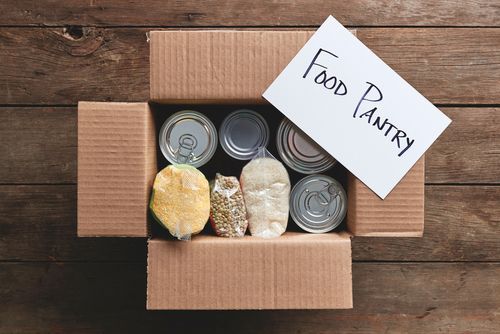 Almost every area of the country has access to at least one food pantry. Some people who are too embarrassed or afraid to visit a community food center, however, may show up on your church's doorstep. If your faith community has the means and the space to start a food pantry, it can be a very rewarding venture. There are many factors to consider before you open its doors, though.
Almost every area of the country has access to at least one food pantry. Some people who are too embarrassed or afraid to visit a community food center, however, may show up on your church's doorstep. If your faith community has the means and the space to start a food pantry, it can be a very rewarding venture. There are many factors to consider before you open its doors, though.
Research Local Resources and Regulations
A good way to start your own food pantry is in partnership with an existing one. Established organizations are often a wealth of information on what to do and what to avoid when establishing your own center. Talk to your local government about the specific laws that regulate food distribution in your area. You may also want to talk to your church accountant about applying for tax exempt status.
Understand Your Community
During your community recognizance, you may discover that the needs of your city are being met by the food distribution organizations that are already in place. If not, however, what you learn can help you form your mission and vision statement. You must understand a need before you can meet it, and making sure donated food gets to the people around you who need it most is no exception. This information becomes what drives your action.
Follow Food Safety Guidelines
Any time you handle or distribute food, you have to make sure that you are doing it safely. After all, it doesn't matter how good your intentions are if the outcome makes people sick. There are many agencies that outline safety guidelines for food banks and food pantries. It's important to make sure you have the right space and equipment to store food properly. When you accept food that has to be refrigerated, you will need not only reliable equipment but a backup generator just in case the power goes out. Even if you are only accepting shelf-stable food, you still need a climate-controlled space to store it, and you must pay close attention to expiration dates.
Select and Train Staff
Even the smallest food pantries are still a lot of work, and they require several people all pulling their weight to be successful. You may be committed to taking care of all the administration yourself, but there are a number of other essential tasks you don't want to forget:
- Assisting guests
- Restocking shelves
- Cleaning the space
- Keeping accurate inventory records
While most of your pantry staff is likely to consist of volunteers from the church at the start, as you become more established, it may be helpful to consider hiring a manager or overseer of some sort. Having a second in command can help you streamline operations so that nothing falls through the cracks.
Create a Distribution Plan
Not every food pantry operates the same way. Once you know how many volunteers you have and how many hours a week they're available, you can create a distribution plan that makes sense for your center. Some food pantries operate like small grocery stores, where guests can browse the aisles and select their own food. Others work like a food co-op, where each member signs up for a prepacked box of groceries every week or month and picks it up at a designated time. If you have a lot of guests who don't have reliable transportation or are homebound, you may need to consider delivery options. Whatever method you choose, it's important to be consistent so that people know they can depend on regular help.
Starting a food pantry is a lot of work, but it is also rewarding. Being able to serve the members of your community for whom nutritious food is scarce is a great way to live out the mission of the church.



